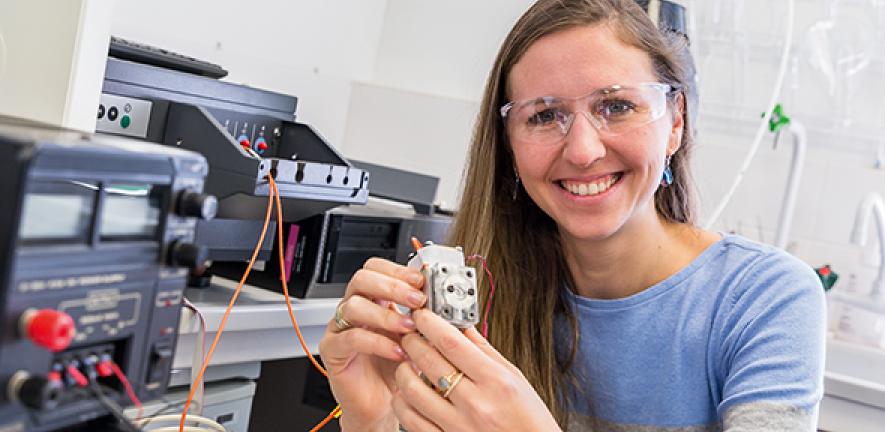
Research Fellow Dr Tanya Hutter has already set up one company to commercialise her work in miniature sensor technology. SensorHut is currently developing robust, small and cheap sensors for detecting toxic gases and should have its first functional prototype before the end of this year.
Now, in collaboration with colleagues at the University of Cambridge School of Clinical Medicine, Tanya is forming a second start-up called Kalium Diagnostics. (Kalium is the Latin for potassium). Here, different miniature sensor technology will lead to a test kit that will benefit patients whose potassium levels can be either particularly high or low.
"Patients with kidney failure and certain rare genetic kidney disorders were asking why they couldn’t monitor their own blood potassium levels the way people with diabetes monitor their blood sugars."
Our kidneys are responsible for keeping many substances in the body in balance (including potassium, salt, calcium and acid). When any of these goes wrong, disorders including hypertension or recurrent kidney stones can result.
In extreme cases, abnormal potassium levels can be fatal. But at the moment, patients have to visit a hospital or GP to get their potassium levels checked, resulting in delay in getting results and appropriate treatment. The simple finger-prick test the team is developing would make it possible for patients to monitor their own blood-potassium levels and quickly seek medical help if there were dangerous levels.

The work arose from a conversation between Tanya, a member of the multi-disciplinary Elliott research group here and Fiona Karet, University Professor of Nephrology and Honorary Consultant in Renal Medicine at Addenbrooke’s Hospital.
They met at Darwin College where both are Fellows. "Fiona works with patients with kidney failure and certain rare genetic kidney disorders," Tanya explains, "and some were asking why they couldn’t monitor their own blood potassium levels the way people with diabetes monitor their blood sugars."
Since then Tanya and her collaborators have been developing the technology. They have been helped in this by grants from Kidney Research UK, Addenbrooke's Charitable Trust and Addenbrooke's Kidney Patients' Association for the early technology development: miniaturisation of the sensor strips and the proof-of-concept.
The team has now submitted additional applications for further funding, including to the MRC and Innovate UK, to develop the product, test it in clinical trials and commercialise it. The project has also involved students from the Department of Chemistry, as well as EnterpriseTECH and i-Teams projects.
Kalium Diagnostics' proposed hand-held device will contain miniature single-use disposable sensors to measure potassium levels from a small drop of blood from a finger-prick and would give an instant reading.
This could benefit a wide range of patients both with kidney disorders and other problems, and will empower them to help manage their conditions, as well as assisting health care professionals and avoiding unnecessary trips to hospital.
The fledgling company got a boost in June when Kalium Diagnostics won the inaugural AstraZeneca Start-Up Science Competition. As a result, the team will receive one-to-one business mentoring from AstraZeneca, a month’s free lab space and a free place on the Judge Business School 'Ignite' programme.
And in early July it was named as one of the winners at the inaugural Accelerate@Babraham competition. The prize offers Kalium access to the Accelerate labs at Babraham Research Park, mentoring from industry experts and a £20,000 cash prize which it will put, among other things, towards protecting the sensor IP.
The Kalium Diagnostics website is hosting a questionnaire for patients, to gauge the levels of interest in using such a test kit.
"We’ve had a lot of interest," Tanya says. "Over 300 patients have already completed the questionnaire and some have already sent emails asking where and when they can buy the kit."

